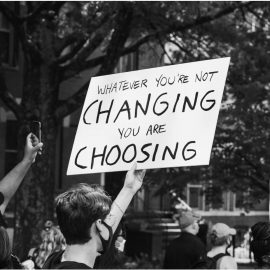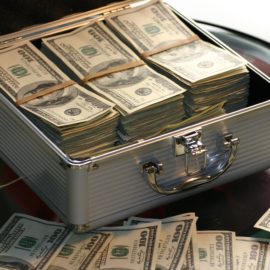

This article is an excerpt from the Shortform summary of "Orange Is The New Black" by Piper Kerman. Shortform has the world's best summaries of books you should be reading.
Like this article? Sign up for a free trial here .
Does Orange Is the New Black talk about prison labor in the US? How does it address the issue?
Prison labor in the US is an ongoing social issue. See how Piper Kerman writes about it in Orange Is the New Black and her own experience working in Danbury Prison.
Read more about Prison labor in the US and Orange Is the New Black.
Prison Labor in the US
At Danbury, inmates performed menial labor for $0.14 per hour. These were low-skill jobs, providing prisoners with none of the workforce training or experience they would need to reintegrate into society upon release. This dysfunctional system, Piper learned, was a contributing factor to high rates of recidivism—prisoners simply re-entered the criminal justice system when they couldn’t get living wages outside of it. Prison labor in the US perpetuated this unjust system.
The women at Danbury used their paltry wages to buy overpriced commissary items like toiletries or feminine hygiene products that weren’t provided by the BOP. Piper wanted a job so she could stock up on much-needed items and repay her friends who had loaned her these things upon arrival.
Some prisoners worked for private companies, like Unicor, that contracted with the federal prison system. Although these jobs paid more, they were still exploitive—these companies were taking advantage of what amounted to forced labor to pay the kind of starvation wages that would be illegal anywhere else but the penal system. Other jobs, meanwhile, were coveted by the inmates because they offered rich opportunities for smuggling and contraband.
Piper wanted to work in the prison education program, believing that, with her background, she would be a unique asset. Despite her enthusiasm, Piper was warned against this job by the other inmates. They told her that it was understaffed, poorly supervised, and that she would have to deal with unruly and insubordinate student-inmates with no interest in learning.
Electrical Shop
Prison labor in the US required Piper to work while she was in prison. Ultimately, Piper was assigned to a job in the electrical shop. On her work crew were two other inmates, the perpetually nervous Little Janet and Levy, a French Moroccan Jew. Piper developed a quick distaste for Levy, who was snobbish and constantly insisting that no one else at Danbury had any “class.” The head of electrical was the cruel and odious DeSimon, who took pleasure in emotionally tormenting the inmates. DeSimon was the head of the CO union and widely disliked even by his colleagues.
Piper and the other inmates lacked any background in electrical work and were poorly trained for their jobs, creating hazardous conditions. One day, Piper found, to her horror, that she’d walked out of the shop without returning the screwdriver she was using. This was strictly prohibited, as tools like screwdrivers could be used as weapons. All tools needed to be properly signed out and returned at the end of the day. Piper feared that it was only a matter of time before DeSimon fingered her for the infraction, which could result in her being sent to the SHU and possibly even having time added to her sentence as punishment.
In a panic, she disposed of the screwdriver and hoped that the whole thing would just blow over. She told the whole story to Nina, who reassured her that nothing was likely to come of it—DeSimon was too lazy to pursue the matter, nothing could be proven, and they weren’t going to waste precious limited space in the SHU on the likes of Piper. However, this goes to go the issues with bureaucracy regarding prison labor in the US.
One day, DeSimon took Piper, Little Janet, and Levy in a van to a pump house just outside the prison. He then left them outside of the pump house and drove off for several hours. This was pure emotional torment for the three—DeSimon surely knew that if any prison officials passed by and saw them standing outside, off-campus, in their uniforms, they could be charged with attempting to escape. Finally, he returned and ordered them to clean the pump house in preparation for an upcoming inspection of the prison by the BOP. The work was grim and dark—the women screamed when they found discarded snakeskins in the pump, which elicited an evil chuckle from DeSimon.
Out of Electrical
Prison labor in the US often is defined by poor working conditions. Piper Kerman’s experience reflected this, even though she believed she was getting more skilled at her work. But working in the electrical shop with the detestable Mr. DeSimon was a grim reminder for Piper that she was still in prison and, therefore, subject to the whims and power trips of the COs. Piper had particular distaste for DeSimon, who took delight in emotionally tormenting her. One of his favorite ways to tweak her was to call her “Kermit,” instead of her last name, Kerman. The whole experience of working in the electrical shop was degrading, dehumanizing, and often dangerous.
One day, the electrical crew was working on a project to fix the air conditioning in the visitors’ room on the floor above. This required them to snake long, thick cables through a hole in the roof and connect them on the next floor. It was a multi-person job, and quite a dangerous one at that—someone had to lift the cables off the ground floor, hand them to someone perched atop a ladder, who then needed to feed them through to the person on the next floor. If someone dropped the heavy cables, the person on the ladder could fall and become gravely injured. DeSimon assigned Piper the job of “greaser.” She was to lubricate the cables with a petroleum jelly, which would make them easier to snake through.
He deliberately gave Piper this job so he could direct leering and menacing sexual innuendos at her. He ordered her to grease up the “horse cock,” in reference to the phallic-looking cables. The rest of the day, he made lewd jokes to Piper about how much she enjoyed “horse cock.” It was the most disgusting and threatening experience she’d had at Danbury, one which demonstrated to her the rampant culture of sexual harassment and abuse among the male COs, yet another issue with prison labor in the US.
Outraged, Piper reported the incident to DeSimon’s boss and requested a transfer out of the hated electrical shop. To her great relief, her request was granted and she secured a transfer to construction in July.
Working on the construction crew that summer, Piper was part of a team that was building a house on campus for the incoming prison warden (Warden Deboo was leaving for a new position in California). Although the work was hard, Piper enjoyed the opportunity to be working inside a house instead of toiling in the electrical shop. She noticed how physically strong she had become since arriving in Danbury that February.
Working on the house one day, she went into the bathroom and took the opportunity to strip off her clothes—something she lacked the freedom and privacy to do in the cramped quarters of the Ghetto. It was the first time she’d seen herself naked in a mirror in over half a year. To her amazement, Piper saw that she’d lost many of the physical marks of the stress she’d accumulated since being indicted. She looked as young as she had when she jumped the waterfall in Indonesia ten years ago. Somehow, prison had recharged and rejuvenated her. It was as if she had gotten a new beginning.

———End of Preview———
Like what you just read? Read the rest of the world's best summary of Piper Kerman's "Orange Is The New Black" at Shortform .
Here's what you'll find in our full Orange Is The New Black summary :
- The real, more nuanced story behind the hit TV show
- How upper-class Piper Kerman landed in prison on drug charges
- The key lessons Kerman learned about society and herself






